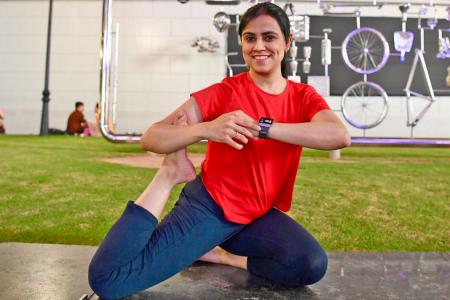HPB study gathers health data from individuals in real time
This is done via smart watch linked to app that sends information to the board
Nearly every day, Ms Geeta Khandelwal wears a smart watch linked to an app that sends the Health Promotion Board (HPB) real-time data about details like her heart rate, number of steps she walked, sedentary time and sleep.
She also diligently logs her daily meals and drinks into the app, down to the portion size.
The 38-year-old freelance consultant and editor is one of 2,000 young working adults here who are part of a $1.2 million two-year HPB study that mines their data to personalise health promotion efforts.
The study, called Health Insights Singapore, or hiSG for short, will also serve as a resource for future public health research, according to HPB's chief executive officer Zee Yoong Kang.
It could also be used to test policies before they are implemented, he added.
The study marks HPB's foray into precision public health, which is generally defined as providing the correct intervention to the right population at the right time.
"Public health struggles because it operates at that high level of generalisation, therefore individuals find it very hard to implement a lot of this advice," said Mr Zee.
"We now have the opportunity to be much more precise, so we do anticipate that many of our guidelines can be refined and maybe overturned."
The HPB recruited participants aged 21 to 40 last August, targeting this age group because it is the period when obesity rates are observed to spike.
To build a comprehensive profile of each participant, the HPB collects details like their age, gender, body mass index and fitness level.
Participants also have to meet requirements such as wearing the smart watch for at least eight hours a day, on at least five weekdays and two weekends each month, and recording their meals on at least three days every three months.
As a form of motivation, participants get to keep their smart watch - a Fitbit Ionic - at no cost if they adhere to these requirements.
But if they do not, they will have to forfeit their $50 deposit.
Another incentive is the points participants can rack up when they fulfil criteria like logging their meals and synchronising their steps. These can be exchanged for food and shopping vouchers.
Five months in, the study has thrown up some intriguing preliminary findings.
For example, researchers found that of the least active participants who averaged a daily step count of 6,100, more of them were underweight (15 per cent) than overweight (12 per cent) or obese (7 per cent).
Meanwhile, the exercise enthusiasts who averaged 13,500 steps a day had the biggest proportion of overweight (26 per cent) and obese (14 per cent) participants.
The HPB said that reasons for overweight participants exercising a lot could be that they are simply more muscular or are trying to lose weight.
Researchers are hoping to gather more data and broaden it to topics like mental health.
Get The New Paper on your phone with the free TNP app. Download from the Apple App Store or Google Play Store now



